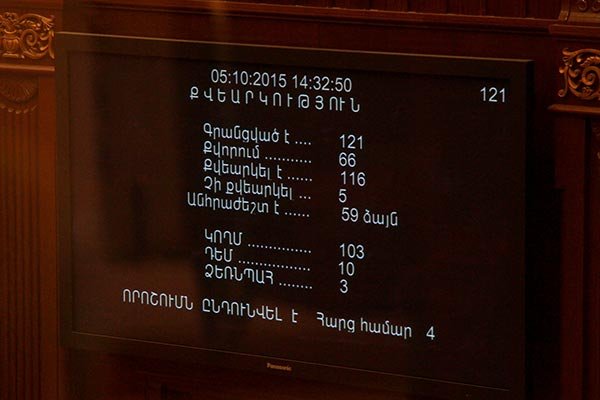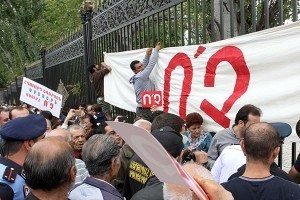YEREVAN—Armenia’s National Assembly approved the proposed package of constitutional reforms earlier today, with a vote of 103 to 10. Three members of the National Assembly abstained. The proposed reforms call for a shift from a semi-presidential to a parliamentary form of government.

The reforms also look to introduce a governmental system in which the powers of the president are drastically reduced, and are almost only ceremonial. According to the proposal, Armenia’s president will be elected for a seven-year term (currently a five-year term) by parliament, not a national vote, and can only serve one term.
A protest calling for authorities to vote against the reforms was held outside the National Assembly during the vote; four people were detained, reported Panorama.am.
It is likely that a national referendum on the new constitution will be held in early December.

The Armenian Revolutionary Federation (ARF) has supported and promoted a parliamentary system of government in Armenia since independence. In an interview with Satik Seyranyan of Armenia TV’s R-Evolution program on Sept. 20, ARF Bureau representative Hrant Markarian explained that the ARF is supporting the proposed constitutional changes in Armenia because it calls for a shift to a parliamentary system of government—something that, according to Markarian, can greatly benefit the country.
“For the past 25 years, from the very days of the democratization process in Armenia, the ARF has always advocated for a parliamentary system of government,” said Markarian. “In 1995, during the drafting of the constitution, the ARF even had its own draft constitution, its own proposal, which was fundamentally advocating for a parliamentary system.” The ARF has participated in presidential elections in order to help transition the country to a parliamentary system, he added.
Under the new system, Armenia would work with a 101-seat parliament with a 5-year term elected entirely by proportional representation. Under the current system of government, there are 131 members of parliament, with 41 elected in first-past-the-post constituencies and the rest by proportional representation.
Mkrtchyan to Discuss Constitutional Reforms in Boston, Chicago, NY
Former ARF Bureau Member and Armenian Education Minister Levon Mkrtchyan will visit the Armenian communities of the Eastern United States next week, when he will speak about the proposed constitutional reforms.

Mkrtchyan will speak at the Armenian Community Center of Chicago (1701 N. Greenwood Ave. Glenview, Ill,) on Thurs., Oct. 7 at 7:30 p.m.; the Armenian Community Center of New York (69-23 47th Ave., Woodside, N.Y.) on Fri., Oct. 9 at 7:30 p.m; and at the Papken Suni Agoump (Armenian American Social Club, 76 Bigelow Ave., Watertown, Mass.) on Sun., Oct. 11 at 2 p.m.
Mkrtchyan, a graduate from the Yerevan State University (1986), is a historian and pedagogue. From 1989-94, he worked as a research assistant in the Department of Armenian History at Yerevan State University. Since 1989, he has been a professor and docent in the Yerevan State University Department of Armenian History. From 1998-99, he served as Armenia’s minister of education and science. He has served as advisor to the prime minister of Armenia (1999-2000), and was appointed deputy minister of foreign affairs in 2000. From 2001-03, he served again as the minister of education and science.


This is encouraging and a huge step in the right direction.
What is notable is that it was approved by 103 votes- 78.6% of the members, a solid majority.
Can the AW please find the answer to the following question:
What is the minimum threshold, i.e. minimum vote required to win a seat in the parliament?
Vart Adjemian